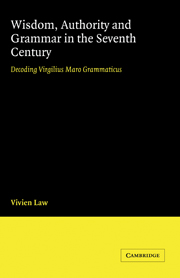Book contents
- Frontmatter
- Contents
- Preface
- Abbreviations
- Introduction
- 1 The outer layers: parody and word-play
- 2 The wisdom tradition
- 3 Avarice and the four keys to wisdom
- 4 The multifarious nature of wisdom
- 5 Heretical knowledge? The constitution of man
- 6 The Epistolae: Virgilius' Retractatio?
- 7 Concealment of mysteries: the techniques of secrecy
- 8 Virgilius and the seventh century
- 9 Conclusion
- Appendix 1 Epistola II 14-93: The vocative of ego
- Appendix 2 Epitome XV: The catalogue of grammarians
- Notes
- Works cited
- Index
7 - Concealment of mysteries: the techniques of secrecy
Published online by Cambridge University Press: 10 November 2009
- Frontmatter
- Contents
- Preface
- Abbreviations
- Introduction
- 1 The outer layers: parody and word-play
- 2 The wisdom tradition
- 3 Avarice and the four keys to wisdom
- 4 The multifarious nature of wisdom
- 5 Heretical knowledge? The constitution of man
- 6 The Epistolae: Virgilius' Retractatio?
- 7 Concealment of mysteries: the techniques of secrecy
- 8 Virgilius and the seventh century
- 9 Conclusion
- Appendix 1 Epistola II 14-93: The vocative of ego
- Appendix 2 Epitome XV: The catalogue of grammarians
- Notes
- Works cited
- Index
Summary
One of the strangest features of Virgilius' writing for a modern reader — and surely for his contemporaries as well — is his language. Grammarians, we learn in childhood, are the arbiters of correct speech. They record the usage of the writers acknowledged as the best, and thereby create a norm: descriptive in intention, prescriptive and ultimately proscriptive in application. Grammarians reserve the right to make up examples when their favourite authors refuse to oblige, giving rise to anything from the bland — la plume de ma tante or ‘John is easy to please’ — to the implausible — albus Socrates currit bene or the celebrated ‘the postillion has been struck by lightning’ — to the improving and morally directive: ‘idleness produces want, vice, and misery’. But inventing words and scrambling forms? Such outrageous behaviour accords ill with the self-esteem and self-importance of grammarians from Antiquity on.
Virgilius is not alone in twisting language, or so he would have us believe. The first in his circle to practise the scrambling of words (scinderatio fonorum) was his teacher Aeneas. Asked by Virgilius why he did so, Aeneas replied:
My son, words are scrambled for three reasons: first, so that we may test the ingenuity of our students in searching out and identifying obscure points; secondly, for the ornamentation and reinforcement of speech; thirdly, lest mystical matters which should only be revealed to the initiated be discovered easily by base and stupid people.
(A X 3–9)- Type
- Chapter
- Information
- Wisdom, Authority and Grammar in the Seventh CenturyDecoding Virgilius Maro Grammaticus, pp. 83 - 96Publisher: Cambridge University PressPrint publication year: 1995

